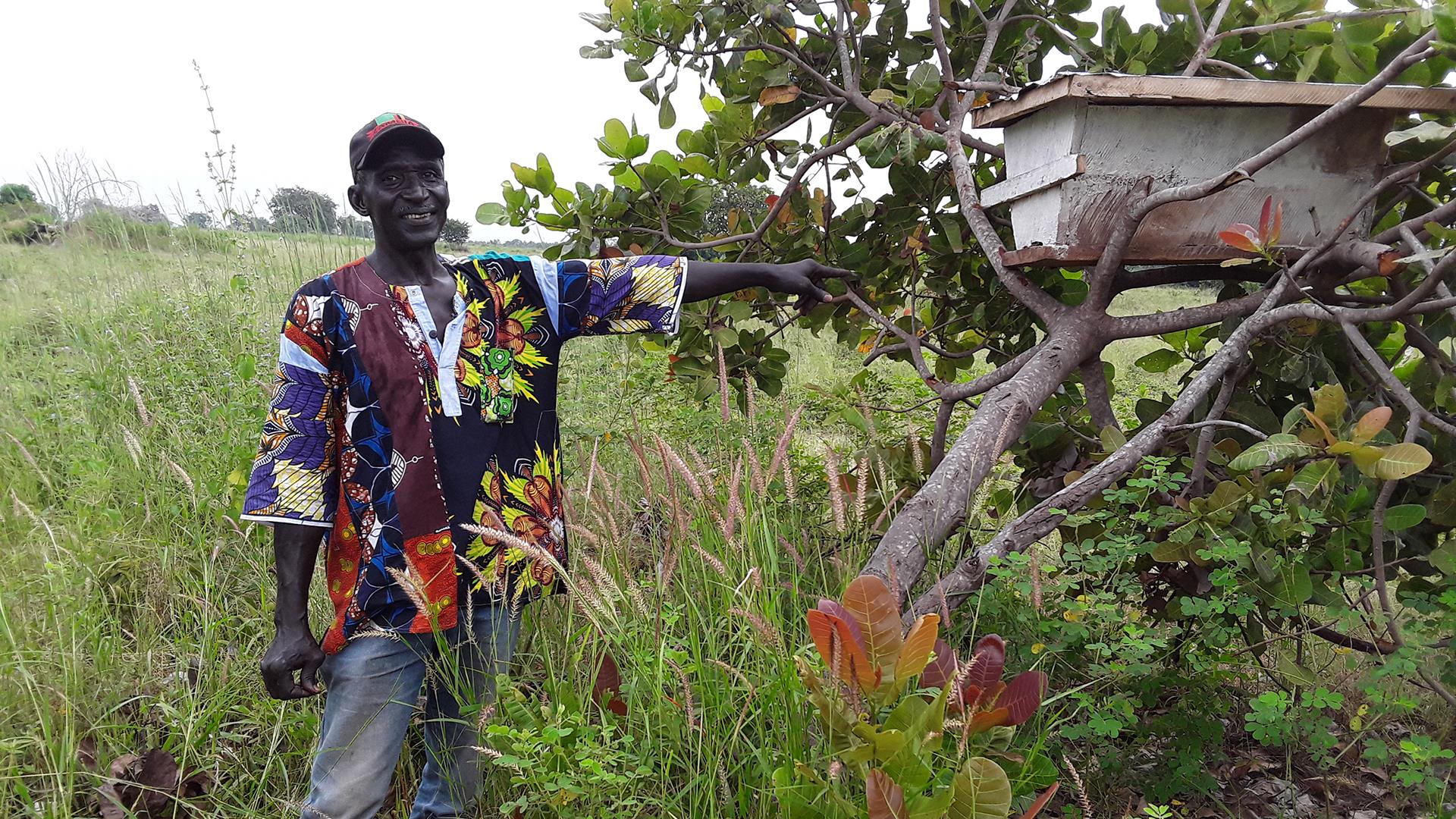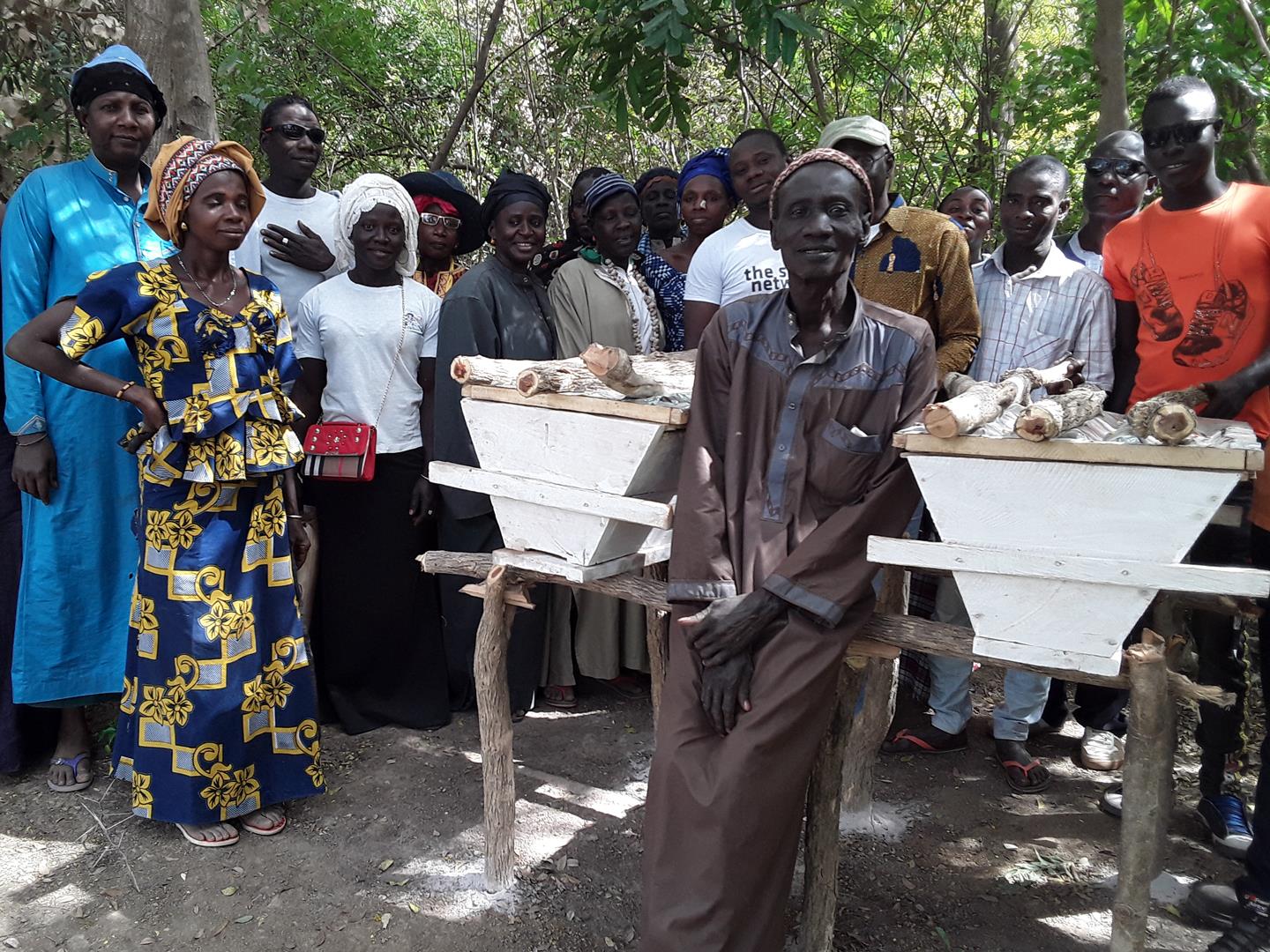
No sweeter business
Embracing beekeeping as a livelihood in the Gambia’s dryland forests
The growing rural population in the Gambia has struggled with sustainably managing dryland forests while relying on them for livelihoods and food security. An FAO project has been encouraging beekeeping as an option to increase incomes while protecting natural resources. ©FAO/Sambou Nget
13/04/2022
They are dotted with riverine vegetation, palm and hardwood trees. They are speckled with salt flats, savanna and mangrove creeks. At the first glance, the forests and the woodlands of the Gambia, tinged in different shades of green, look menacing and breathtaking in equal measure.
Adorned with an array of prominent baobabs, striking silk-cotton trees and jades of mangrove forests found both far inland and along the humid banks of the river Gambia, the country holds 480 000 hectares of forests with unseen promise.
These forests and woodlands have, however, seen swift depletion due to a rapidly increasing population as well as unsustainable resource extraction and uncontrolled forest fires. The growing rural population in this West African nation has struggled with poverty and with sustainably managing these dryland forests while relying on them for their livelihoods and food security.
Through a flagship programme spearheaded by FAO and the Gambia’s Department of Forestry, the “Community-based Sustainable Dryland Forest Management” project has outfitted groups of community beekeepers, known locally as Honey Enterprise Groups, with beekeeping equipment such as beehives, uniforms, boots, gloves, uniforms and hive tools. With the support of FAO through this Global Environment Facility (GEF)-funded project, the Honey Enterprise Groups are constructing beehives in the forest to harvest honey for their livelihoods.
“I would have never thought that our dream of implementing our honey enterprise development plan would come to fruition,” said community beekeeper, Kombeh Njie, as she and her team install 40 beehives at an apiary in Jiffarong village in the Lower River Region in the south of the country.
“Although there have been numerous talks about forest enterprise development in the past, it is only with the current support from the GEF project that our community has had any tangible opportunity to improve our incomes and enhance our livelihoods through honey production. This has indeed changed our lives.”


Beekeepers as part of Honey Enterprise Groups are producing honey and honey products to meet the growing demand and to supplement their income from other agricultural activities. ©FAO/Sambou Nget
Members of the Honey Enterprise Groups recently constructed 205 beehives in the nation through a Cash for Work initiative supported by the project. The Natural Resource Consulting, a local non-governmental organization and one of the project’s implementing partners, in collaboration with the National Beekeepers Association of the Gambia trained the groups on the construction of beehives. FAO and the Gambia’s Forestry Department plan to further scale up the honey business throughout the country to provide employment opportunities.
“High levels of deforestation and land degradation in the region caused mainly by human activities are contributing to droughts, erratic rainfall, disasters, poverty and food insecurity,” said Alpha Mariam Khan, the District Chief of Kuntaya, one of the communities in the North Bank Region of the country where the project is being implemented.
“The honey enterprise initiative provides an opportunity to contribute to the sustainable management of the dryland forests, as forest conservation is our collective responsibility. I call open people of our district to make good use of the opportunity for the benefit of the present and future generations,” he added.
“Once these beehives are all colonized, the income stream of the beekeepers will increase through the sale of honey and its byproducts. The project will enhance their resilience to possible climate shocks while they will be contributing to forests and biodiversity conservation,” Sambou Nget, FAO’s GEF Project Coordinator said.
“There is already a very high demand for honey and honey byproducts for both human consumption and industrial use at the national and global levels. This creates a good market,” he adds. A total of 10 567 people, approximately 50 percent women and 50 percent men, in 18 communities in the Gambia will benefit from this initiative.
Jarra Njie, a female member of the community, states, “Before I used to depend only on seasonal agricultural production to generate income but with the introduction of beekeeping in my community and training provided through the project on value addition to honey products, I now make body cream from beeswax which I sell to supplement my income.”

With bees and beehives dependent on forest settings, communities are more aware of how protecting these resources are also good for their livelihoods. ©FAO/Sambou Nget
Desertification and land degradation are major environmental issues faced in the Gambia. This is highly pronounced in the regions north of the Gambia River. Dryland forests in the country play a pivotal role in halting desertification. Though the forestry sector in the Gambia is reported to contribute to about only 1.2 percent of the national Gross Domestic Product, it holds great socio-economic significance to rural livelihoods.
The project’s overall objective is to halt environmental degradation and the growing threat of desertification in the Gambia because of continued deforestation. The project helps with the legal procedures for community ownership of forests and empowers community members with the skills and knowledge necessary to sustainably manage their natural resources and conserve biodiversity.
“The FAO-GEF forestry project is indeed a blessing for the farmers, livestock and the forests,” said Tara Bah, President of the Joint Sakuru Daala Forest Park Management Committee and a member of the honey enterprise group. “Our forest was saved from bushfires in 2020 thanks to the training the forest park rangers received from the project. The honey enterprise initiative, in particular, will boost households’ food security, nutrition and income.”
FAO works with the Gambia to diversify agriculture, increase fisheries production and improve nutrition while encouraging the sustainable management of natural resources. Projects in the country aim to strengthen the food and agriculture sector to provide livelihoods while supporting communities in mitigating and adapting to climate change impacts.
Related links
Learn more
- Website: FAO country profile: The Gambia
- Website: FAO & the GEF
- Website: FAO & Forestry
- Website: Dryland Forestry

